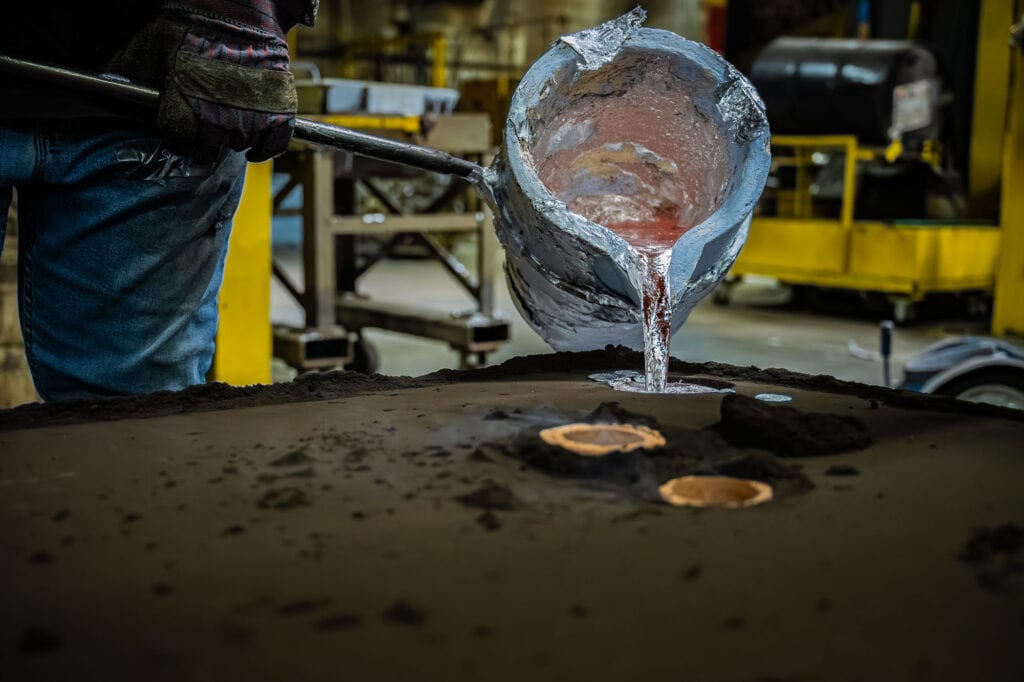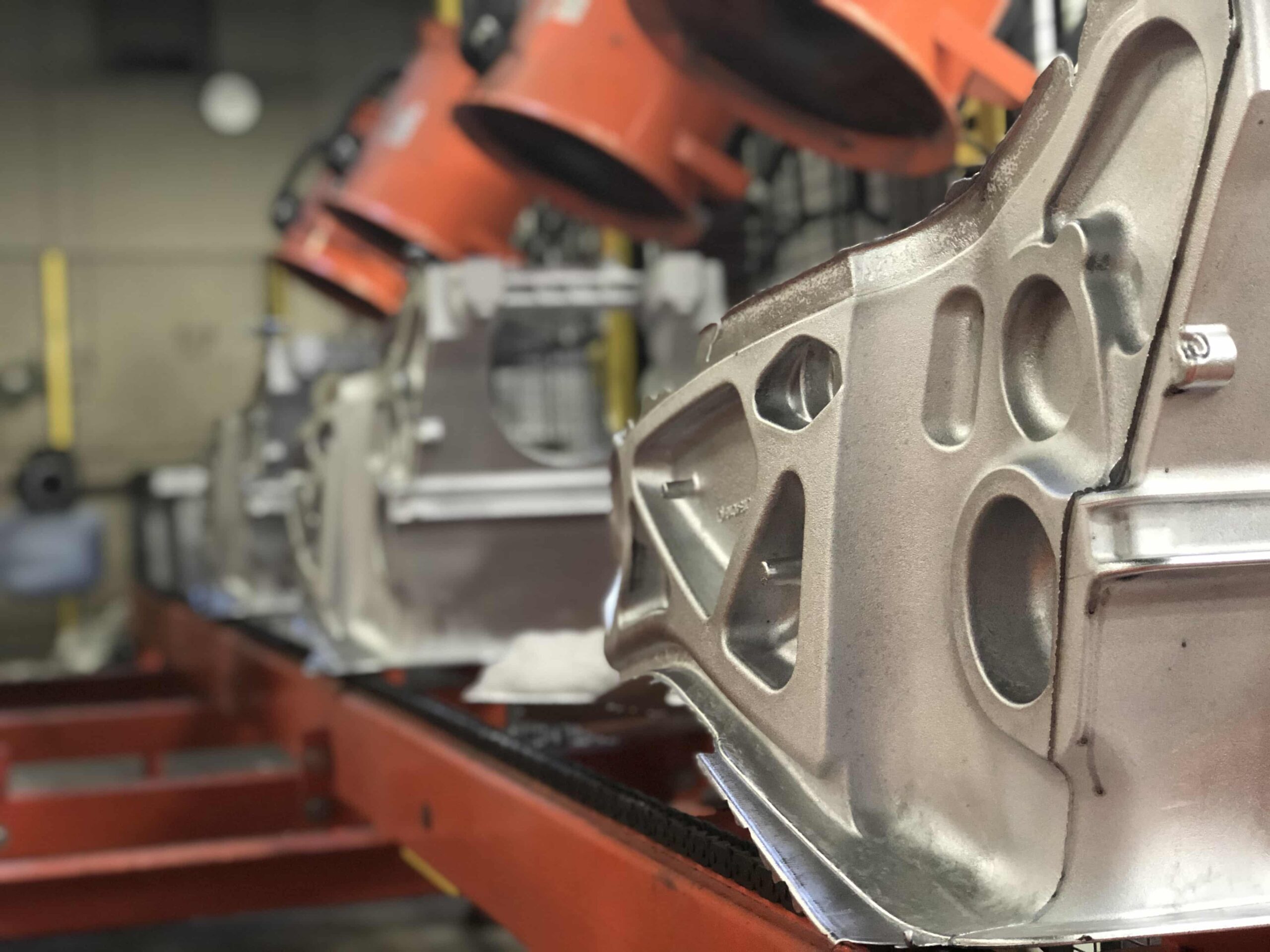The Role of an Aluminum Foundry Drives Modern Engineering Innovation
Wiki Article
A Comprehensive Overview to the Conveniences of Using Aluminum From Foundries
Aluminum from foundries offers a series of advantages that make it an important material throughout different markets. Its lightweight nature adds to set you back financial savings in transportation and enhances total product efficiency. Additionally, aluminum's remarkable resistance to rust guarantees long life and lessens upkeep needs. The benefits expand past these facets. Understanding the full spectrum of aluminum's properties and their ramifications can reveal even much deeper insights right into its function in modern-day applicationsUnderstanding Foundry-Grade Aluminum
Foundry-grade aluminum is a customized product renowned for its phenomenal buildings and flexibility in numerous applications. This kind of aluminum is typically generated through managed spreading processes, allowing for precise control over its structure and microstructure. Because of this, foundry-grade aluminum exhibits superior mechanical properties, including exceptional toughness and corrosion resistance, making it appropriate for requiring atmospheres.In enhancement to its architectural integrity, foundry-grade aluminum can be conveniently built into complex shapes, giving designers and engineers with versatility in their tasks. Its capacity to withstand heats better enhances its appeal for industries such as vehicle and aerospace, where efficiency and integrity are crucial. Foundry-grade aluminum is often recyclable, adding to sustainability initiatives. By using this material, makers can achieve an equilibrium of performance, toughness, and ecological responsibility, making foundry-grade aluminum a preferred selection for a vast array of commercial applications.
Lightweight Properties and Their Advantages
The light-weight buildings of aluminum from foundries provide considerable advantages in numerous applications. Lowered transport costs can be achieved as a result of the reduced weight, permitting extra reliable logistics. In addition, the improved product efficiency obtained from utilizing lighter materials can cause improved functionality and customer experience.Minimized Transport Expenses
Aluminum's light-weight properties greatly add to minimized transportation prices, making it an appealing selection for different industries. When contrasted to heavier products such as steel, aluminum permits lighter loads, making it possible for automobiles to transfer even more products efficiently. This decrease in weight can lead to considerable savings on gas consumption, as lighter lorries call for less power to operate. In addition, the capability to move bigger quantities without going beyond weight limitations improves logistical performance. Industries such as aerospace and automobile advantage specifically from these advantages, as they can enhance delivery processes and decrease total functional prices. As a result, making use of aluminum from foundries not just enhances transport but likewise sustains sustainable techniques by minimizing carbon discharges related to heavy freight transportation.Enhanced Item Performance

Deterioration Resistance: A Secret Advantage
Aluminum from foundries provides remarkable rust resistance, mostly due to its all-natural oxide layer. This protective layer kinds when aluminum is exposed to air, protecting against additional oxidation and damage. Therefore, products made from aluminum can display long-lasting longevity, making them optimal for numerous applications in difficult environments.Natural Oxide Layer
The all-natural oxide layer that forms on aluminum surfaces offers as a necessary defense against rust. This slim, transparent obstacle establishes when aluminum is revealed to oxygen, efficiently securing the underlying steel from different ecological elements. The oxide layer is both stable and long lasting, guaranteeing that aluminum keeps its integrity in time. Unlike other steels that may rust much more swiftly, aluminum's oxide layer prevents the development of rust and various other destructive substances. This particular is particularly advantageous in industries where materials are exposed to wetness or severe chemicals. The visibility of the all-natural oxide layer contributes substantially to the long life and integrity of aluminum items, making it a recommended choice in countless applications.Resilient Toughness
While numerous products succumb to the wear and tears and environmental direct exposure, the durable toughness of aluminum sticks out, mostly due to its exceptional rust resistance. This resistance is connected to a natural oxide layer that forms on its surface area, effectively protecting the metal from wetness, chemicals, and various other destructive agents. Unlike steel, which can rust and deteriorate over time, aluminum continues to be Aluminum Castings intact, making it excellent for various applications, including construction, automotive, and marine markets. Its lightweight nature, combined with sturdiness, enables lowered maintenance costs and longer life expectancies in items. Aluminum from foundries offers a lasting alternative that reduces replacement frequency, adding to both economic efficiency and ecological responsibility. This strength improves its appeal in countless applications.The Recyclability of Aluminum
Given its comprehensive usage across different sectors, the recyclability of aluminum offers a substantial environmental advantage. Aluminum can be reused forever without losing its buildings, making it a prime candidate for lasting methods. The reusing procedure requires only a portion of the power required to create brand-new aluminum from basic materials, decreasing greenhouse gas emissions and saving natural deposits. Furthermore, the recycling of aluminum draws away waste from land fills, adding to more reliable waste monitoring systems.
Cost-Effectiveness in Various Applications
Various industries recognize aluminum's cost-effectiveness, making it a preferred option for various applications. Its light-weight nature reduces transport expenses and energy consumption, greatly adding to total cost savings. In manufacturing, aluminum's pliability permits efficient shaping and developing, lessening sites waste during manufacturing.Aluminum's resilience warranties durability, which decreases the demand for regular substitutes and maintenance. The product's corrosion resistance additionally equates right into lower lasting prices, as it needs much less protective layer and care contrasted to other metals.

Sustainability and Environmental Influence
Aluminum's cost-effectiveness is complemented by its sustainability and favorable ecological impact. The metal is very recyclable, with about 75% of all aluminum created still being used today. This recyclability considerably decreases the demand for have a peek at this site basic material removal, decreasing energy intake and linked greenhouse gas exhausts. Factories play an essential duty in the recycling procedure, using innovative modern technologies to repurpose scrap aluminum effectively.Additionally, aluminum manufacturing from recycled product consumes only around 5% of the power needed for main aluminum manufacturing. This substantial power savings translates to reduce carbon footprints, aligning with global sustainability objectives. In addition, aluminum's light-weight nature boosts gas efficiency in transportation applications, better adding to reduced exhausts throughout its lifecycle. As sectors progressively prioritize sustainable methods, aluminum from foundries becomes a positive option, promoting ecological stewardship while supporting economic development.
Regularly Asked Inquiries
What Are the Usual Applications of Foundry-Grade Aluminum?
Usual applications of foundry-grade aluminum include automotive elements, aerospace parts, equipment, building materials, and consumer goods. Its lightweight nature, deterioration resistance, and excellent mechanical buildings make it ideal for varied industries and producing processes.How Is Foundry-Grade Aluminum Produced?
Foundry-grade aluminum is created through melting aluminum scrap or ingots, followed by alloying with other metals. The liquified aluminum is then cast into mold and mildews, permitting it to strengthen right into numerous forms for varied applications.What Are the Safety Considerations When Dealing With Aluminum?
Safety and security factors to consider when collaborating with aluminum include correct air flow to stay clear of breathing in dust, usage of personal safety devices to protect against skin contact, and recognition of fire hazards related to molten aluminum throughout handling and spreading.Just How Does Foundry-Grade Aluminum Compare to Other Metals?
Foundry-grade aluminum uses a remarkable strength-to-weight proportion compared to many metals, together with superb deterioration resistance and thermal conductivity. Its versatility and ability to be quickly formed make it a favored choice in different applications.What Upkeep Is Needed for Aluminum Products?
Aluminum products require minimal maintenance, primarily involving regular cleaning to avoid oxidation and dirt accumulation (Metal Castings). Protective layers might boost durability, while routine evaluations can ensure structural honesty and resolve any kind of wear or damage immediatelyFoundry-grade aluminum is a specific material renowned for its extraordinary buildings and convenience in different applications. Leveraging light-weight buildings, aluminum improves item performance across numerous applications. Unlike steel, which can corrosion and weaken over time, aluminum remains undamaged, making it suitable for different applications, including building, auto, and aquatic markets. Aluminum production from recycled material takes in just about 5% of the power needed for primary aluminum manufacturing. Foundry-grade aluminum is created via melting aluminum scrap or ingots, followed by alloying with other metals.
Report this wiki page